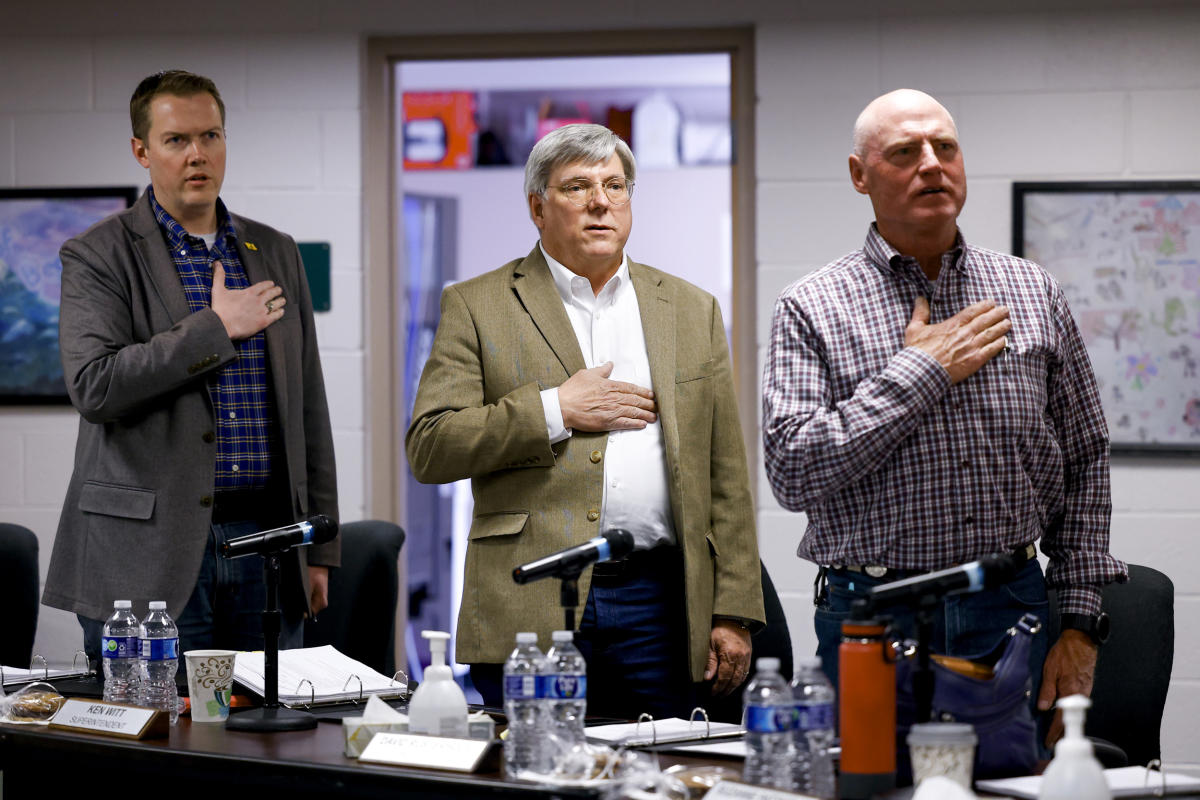WOODLAND PARK, Colo. — When a conservative slate of candidates won control of the school board here 18 months ago, they began making big changes to reshape the district.
Woodland Park, a small mountain town that overlooks Pikes Peak, became the first — and, so far, only — district in the country to adopt the American Birthright social studies standard, created by a right-wing advocacy group that warns of the “steady whittling away of American liberty.” The new board hired a superintendent who was previously recalled from a nearby school board after pushing for a curriculum that would “promote positive aspects of the United States.” The board approved the community’s first charter school without public notice and gave the charter a third of the middle school building.
As teachers, students and parents began protesting these decisions, the administration barred employees from discussing the district on social media. At least two staff members who objected to the board’s decisions were later forced out of their jobs, while another was fired for allegedly encouraging protests.
These rapid and sweeping shifts weren’t coincidental — instead it was a plan ripped from the MAGA playbook designed to catch opponents off guard, according to a board member’s email released through an open records request.
“This is the flood the zone tactic, and the idea is if you advance on many fronts at the same time, then the enemy cannot fortify, defend, effectively counter-attack at any one front,” David Illingworth, one of the new conservative school board members, wrote to another on Dec. 9, 2021, weeks after they were elected. “Divide, scatter, conquer. Trump was great at this in his first 100 days.”
The leaders of the Woodland Park School District are enacting an experiment in conservative governance in the middle of a state controlled by Democrats, with little in the way so far to slow them down. The school board’s decisions have won some praise in heavily Republican Teller County, but opposition is growing, including from conservative Christians and lifelong GOP voters who say the board has made too many ill-advised decisions and lacks transparency.
“I think they look at us as this petri dish where they can really push all their agenda and theories,” said Joe Dohrn, a Woodland Park father who described himself as a staunch Republican and “very capitalistic.” “They clearly are willing to sacrifice the public school and to put students presently in the public school through years of disarray to drive home their ideological beliefs. It’s a travesty.”

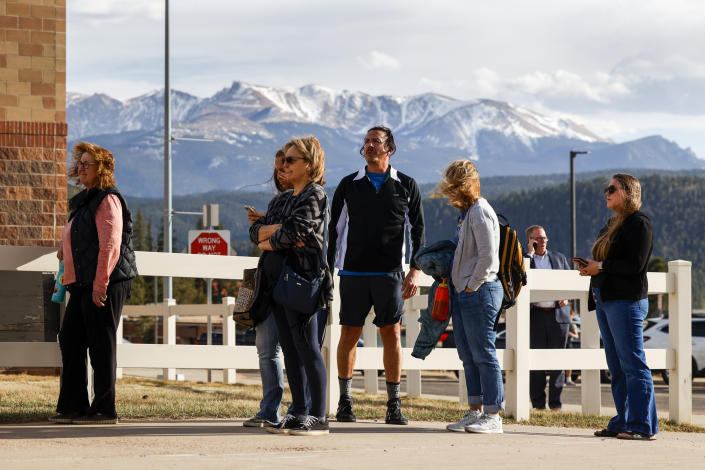
Teachers grew particularly alarmed early this year when word spread that Ken Witt, the new superintendent, did not plan to reapply for grants that covered the salaries of counselors and social workers.
At Gateway Elementary School in March, Witt told staff members he prioritized academic achievement, not students’ emotions. “We are not the department of health and human services,” he said, as teachers angrily objected, according to two recordings of the meeting made by staff members and shared with NBC News.
Someone in the meeting asked if taxpayers would get a say in these changes, and Witt said that they already did — when they elected the school board.
Over the past two years, school districts nationwide have become the center of culture war battles over race and LGBTQ rights. Conservative groups have made a concerted effort to fill school boards with ideologically aligned members and notched dozens of wins last fall.
In Colorado, conservatives started making gains earlier because school board elections are held in off years. Woodland Park offers a preview of how quickly a new majority can move to reshape a district — and how those battles can ripple outward into the community. Some longtime residents say that the situation has grown so tense, they now look over their shoulder when discussing the school board in public to avoid confrontation or professional consequences.
David Rusterholtz, the board’s president, believes that chasm predates his election in November 2021.
“This division is much more than political — this is a clash of worldviews,” Rusterholtz said at a board meeting in January. He concluded his remarks with a prayer for the district: “May the Lord bless us and keep us, may His face shine upon us and be gracious to us.”
Rusterholtz, Illingworth, Witt and three other current school board members declined interview requests when reached by email and approached in person at the district’s office. To tell this story, NBC News reviewed dozens of emails board members exchanged with parents and staff, obtained through open records requests, and spoke with over 40 Woodland Park community members, including students, current and former school staff and administrators, and former school board members.
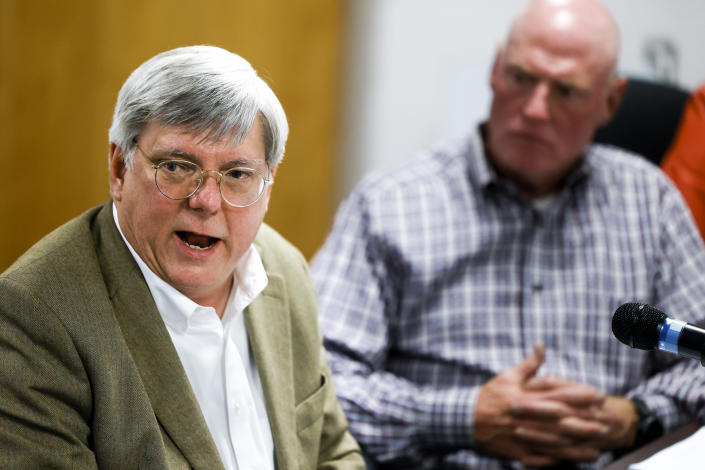
When asked to respond to criticism from school personnel and parents, Illingworth, the board’s vice president, replied in an email: “I wasn’t elected to please the teacher’s union and their psycho agenda against academic rigor, family values, and even capitalism itself. I was elected to bring a parent’s voice and a little common sense to the school district, and voters in Woodland Park can see I’ve kept my promises.”
As the school year winds down, many of the Woodland Park School District’s employees are heading for the exit, despite recently receiving an 8% raise. At least four of the district’s top administrators have quit because of the board’s policy changes, according to interviews and emails obtained through records requests. Nearly 40% of the high school’s professional staff have said they will not return next school year, according to an administrator in the district.
The board’s critics have pinned their hopes on the next election in November — when three of the five school board members are up for a vote — to claw back control of the community’s schools.
“This is an active case study on what will happen if we allow extremist policies to start to take over our public education system,” said David Graf, an English teacher who recently resigned after 17 years in the district. “And the scariest part about it, they knew that this community would bite on it.”

A culture shift on the board
The four candidates who won nonpartisan positions on Woodland Park’s school board in 2021 had to say little but that they were conservative to win. The mostly white, middle-class city of 8,000 people up the mountain pass from Colorado Springs had voted for Donald Trump over Joe Biden by 2-to-1 a year earlier.
But while many conservatives running for school boards across the country recently were swept into office on a wave of parent complaints about critical race theory, library book content and policies supporting transgender youth, Woodland Park had no such activism in 2021. In fact, few people bothered to attend board meetings, according to Chris Austin, a pastor and the lone board member who was not up for re-election that year.
“It was a culture of collaboration,” Austin said. “You had freedom to bring forward your thoughts and evidential data, people listened, we did not even know each other’s political affiliations. That’s the way I experienced it for the first nearly two-and-a-half years. Then it shifted abruptly with the first meeting with the new board.”
Newly elected conservatives on the board acted quickly to approve an agreement with Merit Academy to become the district’s first charter school.
Yet, the vote, at a special meeting on Jan. 26, 2022, caught community members by surprise because the agenda made no mention of Merit — it had been listed instead as “board housekeeping.”

The district’s teachers union complained in an email to middle school staff that the board’s action was “underhanded, and at worst illegal.” A parent sued, aiming to force the board to follow open meetings law. A trial court judge did not rule on the legality of the board’s actions but ordered the board to list agenda items “clearly, honestly and forthrightly.”
In response to the teachers’ complaints, Illingworth accused the union of attempting to organize a “coup,” and instructed then-Superintendent Mathew Neal to make “a list of positions in which a change in personnel would be beneficial to our kids” and “help the union see the wisdom in cooperation rather than conflict.”
Illingworth’s emails spread after parents obtained them through open records requests. Subsequent board meetings attracted boisterous crowds, as teachers accused board members of creating a hostile environment, while other community members spoke in favor of the board for supporting “school choice” and quoted Scripture. A handful of parents, including some lifelong Republicans, tried to organize a recall, but failed to get enough signatures to force a vote.
Other parents felt the criticism was overblown.
“I think a lot of people are angry because people don’t like change,” said Andrea Kendall, a mother with children in both Merit Academy and the traditional district schools. “I do feel for the teachers to a certain extent, for sure. I do feel for the board, too, because I feel like they’re trying their best with what they have, and they’re getting attacked for it.”
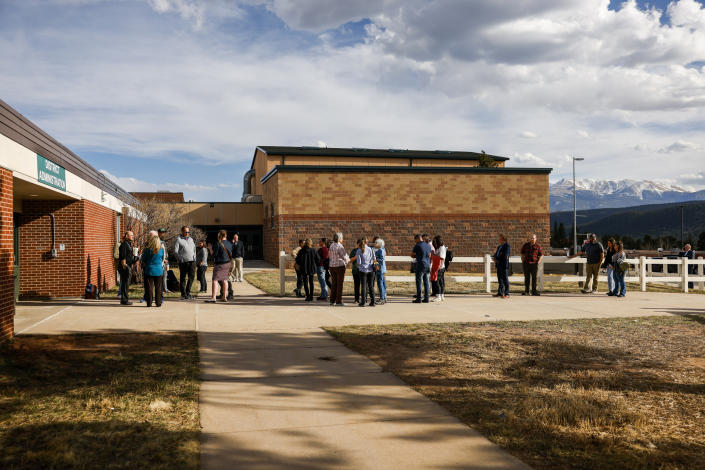
Illingworth said in emails to NBC News that the district’s enrollment has increased, the district had expanded food and transportation services, and academic performance has improved. “The facts show the Woodland Park School District is doing better than ever,” he said.
Neal resigned as superintendent in July 2022. He declined an interview request, but said in an email, “I know how to captain a ship and also know when the direction were headed doesn’t align with my philosophy.”
Austin resigned from the board last November for a similar reason: “The direction of the new board was just incongruent with my value set.”
For Austin’s replacement, the board appointed Mick Bates, who records show donated $500 to Illingworth last fall and was a recent chair of the county Republican Party.
And for Neal’s replacement, the board picked Ken Witt.
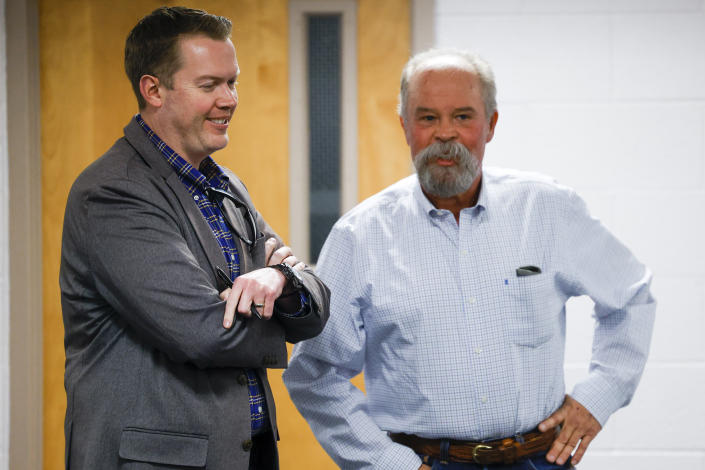
‘Everyone has their line’
A week before Witt was hired, on Dec. 13, students in a class called Sources of Strength, which is part of a national suicide prevention program, asked their teacher what should they know about him as the sole finalist for the superintendent job.
Sara Lee, a longtime teacher at Woodland Park High School, responded, “You should Google him.”
The students did, and they didn’t like what they learned.
They discovered that Witt, as president of the school board in neighboring Jefferson County, supported a plan in 2014 to ensure the district’s curricula would promote patriotism and not encourage “social strife.” Witt said students who protested the board policies at the time were “pawns” of the teachers union. After he and two other conservative members of the board were recalled, Witt became executive director of an organization that oversees charter, online and other schools and helped launch Merit Academy.

Woodland Park students staged a protest against Witt’s hiring on the morning of Dec. 14. An hour later, the administration placed Lee on leave. The district said she was “inappropriate and insensitive” for sharing information about Witt, according to a letter of reprimand she shared with NBC News, and forbade her from talking about the board and its decisions with students.
The following month, the district transferred Lee to an elementary school, even though she’d worked in a high school setting for 25 years. She quit, and got a job at a school that’s 45 minutes away.
“It was my values that were being called into question,” Lee said. “It was the fact that I was suddenly in a place where I couldn’t have an open and honest conversation with my students. And that had never happened in the 18 years I’d been in Woodland Park.”
The board held its lone public interview with Witt on the evening of Dec. 19. Afterward, Witt met privately with Rusterholtz, Illingworth and board member Cassie Kimbrell in the district’s administrative office.
Two days later, the board voted to hire Witt.

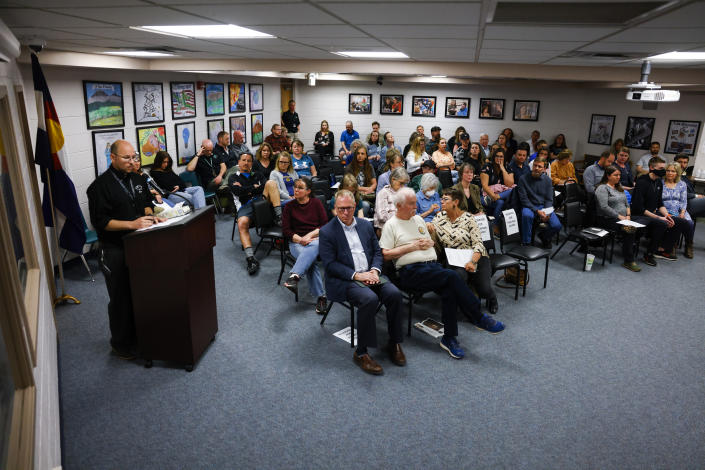
But that private meeting — which was captured by a surveillance camera — became a flash point. Any time three or more members of a school board gather and discuss the district, the meeting must be open to the public under Colorado law. People in the community began clamoring for the district to release the footage.
Witt declined. The district argued in response to one mother’s lawsuit that the conversation “was of a personal nature,” and that it would be a security risk to disclose where the surveillance camera was placed.
Teller County District Court Judge Scott Sells disagreed and said he found it “troubling, the lack of transparency by the school board and the school district.” Sells ordered the video to be released, but the district appealed and the case is still pending.
NBC News obtained the footage, which shows Witt, Illingworth and Kimbrell walking into the receptionist area of the administrative building just before 8 p.m. Once Rusterholtz joins 7 minutes later, they stand together conversing for 8 minutes and then walk out of the room. There is no audio.
Logan Ruths, the district’s former information technologist, first watched the video in late December, because he was in charge of responding to open records requests.
Ruths said that when he saw it, his first thought was: “This is very damning for the board.”
Ruths, who wears his Eagle Scout ring most days, said he was shocked that the district refused to release the footage. He believed it was part of a recent pattern of withholding public information, which he had repeatedly raised to district administrators and lawyers.
On March 10, Witt summoned Ruths to his office. The district had terminated his position as a “consolidation” measure, according to audio shared with NBC News.
Tearfully, Ruths pleaded with Witt “to be honest, for once,” and tell him the real reason that he was losing his job. Witt didn’t say much. Ruths called him an “awful human being” before walking out.
Miles Tuttle, Ruths’ boss, told Ruths afterward that he was going to resign. “Everyone has their line,” Tuttle said to him, “and this being done to you, that was my line.”
Discouraging civic engagement
At the first board meeting in January with Witt as superintendent, the board voted to adopt the American Birthright social studies curriculum standard. No social studies teachers had been consulted prior to the vote, according to three current employees and an administrator who asked to speak anonymously to protect their employment.
American Birthright materials emphasize patriotism, argue that the federal government should have no authority over public schools and say teachers should not encourage civic engagement, such as registering to vote or petitioning local lawmakers on issues students care about.
“It is terribly important to be a disengaged citizen, and indeed, a disengaged student,” said David Randall, research director at the National Association of Scholars, a conservative organization that created the standards last year.

Randall said American Birthright was modeled off state standards in Massachusetts and Florida. The group received input from dozens of right-wing groups and activists, including the Claremont Institute, the Family Research Council and Moms for Liberty. Randall sees it as a bipartisan alternative to coursework that he described as hijacked by liberal concepts. Critics, though, say it’s biased toward the right — for example, it includes Bill Clinton’s impeachment but not Donald Trump’s.
The Colorado State Board of Education rejected American Birthright in October. The National Council for the Social Studies, a professional trade group for educators, issued a rare warning against using it.
“They’re trying to push a certain agenda down to these kids,” Amy Schommer, a mother in Woodland Park, said of the school board’s adoption of American Birthright. “I’m a conservative but I’m not against my kids learning something they disagree with. They’re trying to fix problems that don’t exist here.”
The district’s adoption of American Birthright had immediate fallout for an elective class called “Civil Disobedience.” Graf, the English teacher, had created the class in 2015 to trace protest movements like Black Lives Matter back to America’s founding.
Five days after the board approved American Birthright, a community member who does not have children complained to Witt about “Civil Disobedience,” and accused Graf of using “Between the World and Me” by Ta-Nehisi Coates — about growing up Black in America — as an “indoctrination tool,” according to emails obtained through open records requests.
A week later, Graf read in The Pikes Peak Courier that Witt had decided Coates’ book would no longer be used because it didn’t conform with American Birthright. Graf said no one from the administration spoke to him about how he taught the class.

Graf resigned last month. “They’re taking autonomy away from teachers, limiting the scope of the free-thinking, controversial discussions that I think are age-appropriate,” he said, “especially for 16-, 17-, 18-year-olds, who are about to go out and experience what it’s like to be an adult.”
Several more high school teachers resigned this year, citing the board as a reason, according to interviews and copies of resignation letters reviewed by NBC News. Some in the community, though, saw this as a good thing.
“I feel like if they’re leaving, it’s because they have an agenda,” said Deborah Bruner, a Woodland Park grandmother. “What it sounds like to me is that this board is going to hold teachers accountable for what they teach, and to teach the truth.”
A contentious meeting
By the time Witt arrived at Gateway Elementary School on March 2 to meet with the staff, emotions were running high.
The teachers had heard that Witt was questioning the need for mental health support for students, and they were worried.
During the meeting, Witt would not commit to keeping the same number of guidance counselors and social workers for the next school year. He said that his focus was on “academic success,” according to the recordings obtained by NBC News.
Staff members tried to explain why it was critical to address students’ emotional issues so that they could learn. One employee mentioned recent familial homicides in the community as an example of the kind of trauma children are facing, including a murder-suicide that left a student dead.
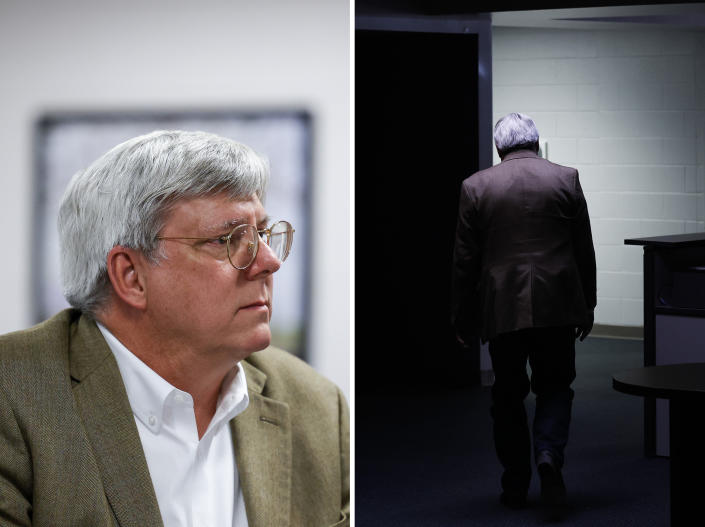
Witt asked if the school had a social worker. The employee replied affirmatively, and then Witt asked, “Did the murder-suicide still occur?” Several people in the room gasped.
That same week, Laura Magnuson, the district’s mental health supervisor, had a call with Witt to press him on reapplying for grants for mental health professionals. She had emailed him to warn that due dates were coming up, and a couple had already passed. If the district did not reapply, it would lose $1.2 million in annual funds that covered the salaries of 15 positions, such as counselors, social workers and career and college readiness specialists.
The following week, after she couldn’t convince Witt to reapply for the grants, she sent him her resignation.
“I feel most worried that this new vision will leave our most vulnerable students and families behind,” Magnuson, who declined an interview request, wrote in an email to Witt.
Magnuson’s email circulated online after Matt Gawlowski, a father who chronicles the administration’s actions on a blog, got a copy through an open records request, and it disturbed some families enough to pull their children from the district.

Craig Johnson, a father who describes himself as a “pro-life, gun loving native of Woodland Park,” transferred three of his children to a neighboring district in Manitou Springs. That district said 47 students from Woodland Park are transferring in the fall.
Johnson said he was particularly bothered that the district’s leaders thought mental health was best left for parents to address at home.
“There are lots of kids for whom home is a problem place, unfortunately,” Johnson said. “So don’t tell me mental health starts at home when we have examples of parents murdering at home.”
Zehan Rogers, a Woodland Park sophomore, said he’s had a friend die by suicide and others who have had depression. He said he doesn’t think the board understands how important having mental health staff available is for the 2,000 students in the district.
“It can save their lives,” he said. “There’s so many unforeseen consequences that will come from this.”

‘A very important step’
At the Woodland Park school board’s most recent meeting on April 12, only a handful of the 50 people packed into a conference room under fluorescent lights voiced support for the board.
One was a man who’d brought a red leather-bound Bible with him. He gave a short speech during the public comment session in which he called teachers “insurrectionists” and implored the board to stand up to them to “stop the next Reichstag that is bound to happen in the Woodland Park school district” — referring to an arson attack on the German parliamentary building in 1933 that Nazis blamed on Communists.
But the hot topic that evening was students’ mental health. The board had proposed a resolution declaring opposition to a bill in the Colorado Legislature to offer voluntary annual mental health screenings of students in sixth grade and above.
Amber Hemingson, a sixth-grade teacher and mother, described how supportive colleagues and previous administrators were when her husband died of cancer in 2020, and her family struggled with depression in the aftermath.

Standing at a podium a few feet away from the board members, Hemingson said the district had provided vital counseling services so she could continue working and her children could function in class. She recalled how Lee, the teacher who recently left the district, once found Hemingson’s suicidal daughter crying in the bathroom and comforted her.
“Selfless WPSD employees cared for orphans and a widow in their distress,” she said, trying not to cry. “Will you look after orphans and widows in their distress, or will Christ say to you, as he said in Matthew 25:45, whatever you did not do for the least of thee, you did not do for me.”
Fifteen minutes later, the board read the resolution, which vowed that the district would opt out of the mental health screenings if the bill passed. Rusterholtz said he was proud to support the resolution because parents should be in charge of their children’s education and mental health.
“This is a very important step,” Rusterholtz said. “This is one more standing in the way of big government taking charge of your children.”
The board passed the resolution unanimously. The man who’d earlier called teachers “insurrectionists” stood and applauded.

This article was originally published on NBCNews.com


